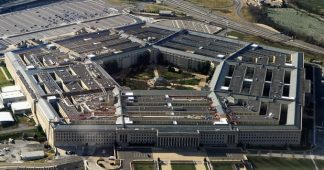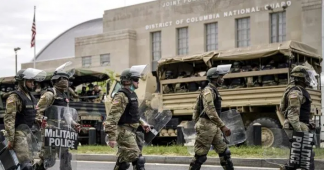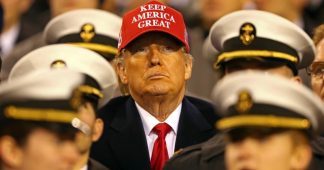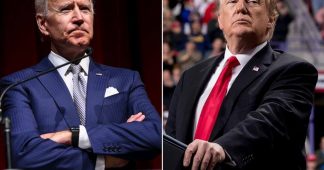Posted on
Nationwide protests had erupted over police killings of black people. Near the White House, tear gas and rubber bullets ejected peaceful protesters from a park to clear the way for President Trump’s now-famous church photo. Trump threatened military force nationwide.
But top military leaders have pushed back against Trump’s aggressive impulses, several invoking the Constitution.
General Mark A. Milley, chairman of the Joint Chief of Staff, apologized for joining Trump on his walk to the church for a political picture. Milley issued a memo to chiefs of the Army, Navy, Marines, Air Force, etc. that said in part:
Every member of the U.S. military swears an oath to support and defend the Constitution and the values embedded in it. This document is founded on the essential principle that all men and women are born free and equal and should be treated with respect and dignity [except slaves – ed.]. It also gives Americans the right to freedom of speech and peaceful assembly….
As members of the Joint Force … you embody the ideals of our constitution, Please remind all of our troops and leaders that we uphold the values of our nation, and operate consistent with the national laws and our own high standards of conduct at all times.
A similar statement, pointing o the constitutional oath, was issued by the Army, signed by Secretary of the Army Ryan D. McCarthy, General James C. McConville, et al. The fact of the oath also entered a message from General Joseph L. Lengyel, bureau chief of the National Guard. Other top officers made statements defending the protests.
Even Secretary of Defense Mark T. Esper, who had urged governors to “dominate the battlespace,” resisted one of Trump’s extreme proposals. Trump thought of invoking the Insurrection Act, of 1807. He would deploy US military and “quickly solve the problem” if any state did not “dominate,” end rioting by “thugs,” and restore law and order. Esper said the Act would not be needed, except as a last resort.
Lawbreakers in the White House
Our “supreme law of the land,” the Constitution (Article I, Section 8, Paragraph 11), reserves the power to “declare war,” i.e. initiate war, to the Congress alone. That clause was generally respected for the first 163 years after the Constitution went into effect on June 21, 1788.
Writings of the Constitution’s framers clearly document their intention. A few examples:
Alexander Hamilton: “The Congress shall have power to declare war”; the plain meaning of which is, that it is the peculiar and exclusive power of Congress, when the nation is at peace, to change that state to a state of war. [“Lucius Crassus” 1, 1801]
… [C]ommander-in-chief of the army and navy … would amount to nothing more than … first General and Admiral … [while the power] of the British king extends to the declaring of war and the raising and regulating of fleets and armies, – all of which by the Constitution under consideration, would appertain to the legislature. [The Federalist 69, 1788]
James Madison: The power to declare war … is fully and exclusively vested in the legislature; … the executive has no right, in any case, to decide the question, whether there is or is not cause for declaring war. [“Helvidius” 4, 1793]
James Wilson: This system will not hurry us into war; it is calculated to guard against it. It will not be in the power of a single man, or a single body of men, to involve us in such distress, as the important power of declaring war is vested in the legislature at large. [To the Pennsylvania ratifying convention, 1787]
Unfortunately, the system lacked any enforcement mechanism to make sure that one man would not hurry us into war. So on June 30, 195o, President Harry S. Truman, already infamous for his two atomic massacres in Japan, plunged the US into a three-year war in Korea that killed over 2.5 million civilians, mostly through US carpet-bombing.
In starting his war, Truman had no congressional permission whatever. Thus began the cult of the president as war-maker. Every subsequent president has imitated Truman, overtly or covertly or both.
Presidents went on to cause humanitarian disasters in Vietnam, Iraq, Panama, Yugoslavia, Libya, and elsewhere. Congress never authorized America’s longest war, begun by Bush Jr. on Oct. 7, 2001, and still terrorizing Afghans after nearly 19 years.
Nowadays every chief executive acts as though his job were that of chief executioner. And the technology of executive killing – though not the law – permits one man to destroy all mankind with a few bombs. It gives him absolute power over life and death of the world.
How seriously do they take the oath?
Trump, like Obama before him, proceeds to “modernize” nuclear weapons, for over a trillion dollars. The supreme law governing the declaration of war has not been modernized. It remains a relic from 1787, disregarded by presidents and most others.
With George Washington presiding, fifty-five exceptional men met in Philadelphia for sixteen weeks and drew up the best constitution they could. Rejecting the monarchal model, they decided that it would take a legislature to declare war, rather than the top man. But they never set up any machinery to stop the executive from assuming dictatorial rule over war.
(It is open to question what mechanism would work – and whether a one-man presidency inherently bears the seed of tyranny, particularly when coupled with a standing army.)
If Trump, on his own whim, ordered the bombing of, say, Iran or Venezuela, it would of course violate the constitutional war power, along with US treaties banning aggression. Would military officers carry out that order, knowing it breached the document they have sworn to uphold?
In 2011 and 2012, citizen Trump repeatedly predicted an attack on Iran by President Obama to help his reelection. As Trump’s poll numbers continue to sink and he grows desperate, he may resort to the same kind of act he thought Obama would commit.
On June 20, 2019, Trump did order the bombing of Iran, supposedly to retaliate for the downing of a spy drone. Military officers did not ignore or nullify that order. A possible catastrophe was averted when Trump changed his mind minutes before the order was to go into effect. Last January 3, his order to murder a top Iranian general visiting Iraq was carried out. I know of no unfulfilled belligerent order by Trump, despite a consistent lack of congressional authorization.
Congress passed a joint resolution to prevent any attack on Iran without congressional authorization, but Trump vetoed it on May 6.
Trump repeatedly pledged peace in a campaign speech on April 27, 2016, promising, “War and aggression will not be my first instinct.” Yet they indeed seem to be his first instinct.
He made Afghanistan his war. On April 13, 2017, twelve weeks after inauguration, came news that MOAB (massive ordnance air blast), largest non-nuclear bomb in the US arsenal, had been exploded in Nangarhar Province, adjoining Pakistan. Even the Bush Jr. Pentagon avoided using it, lest it hit many civilians. Hamid Karzai, former Afghan president, condemned “the inhuman and most brutal misuse of our country as testing ground for new and dangerous weapons.”
Obama, with a record-breaking eight years of illegal war-making in Afghanistan, Iraq, Libya, and Syria, has met his match in the ferocity of Trump’s bombing campaigns, waged in Iraq, Somalia, and Syria as well as Afghanistan. Minimal restrictions under Obama yielded to Trump’s policy of “bomb the s— out of them.” Consequently, civilian casualty tolls have soared.
The full extent of Trump’s war-making is yet to come out. Secret operations in Africa – including Kenya, Niger, Somalia, and Tunisia – have been revealed.
Trump aids the Saudis in its attacks on civilians in Yemen, which have gone on for over five years. Congress voted to forbid US involvement in Yemen, but Trump vetoed the measure.
He recently announced another $500 million in guided-bomb sales to Saudi Arabia; the deal would let Raytheon build the bombs in Arabia. He claims to want it because arms sales provide US jobs. Would you want to work in a factory whose product is used to slaughter the occupants of schools, buses, homes, and hospitals?
In a ground operation nine days after Trump took office, his forces invaded a village in Yemen and, according to Human Rights Watch, killed twenty-five residents.
Having argued repeatedly, as a private citizen, against attacking Syria, on April 6, 2017, President Trump bombed a Syrian airfield, killing sixteen, including nine civilians. (See above link.) His reason? An allegation that Syria had used gas weapons, since disproved.
On June 1, 2020, as widely reported, Trump’s administration itself used gas weapons – to disperse peaceful protesters near the White House.
Paul W. Lovinger, journalist, author, and antiwar activist of San Francisco, may be reached through www.warandlaw.org.











